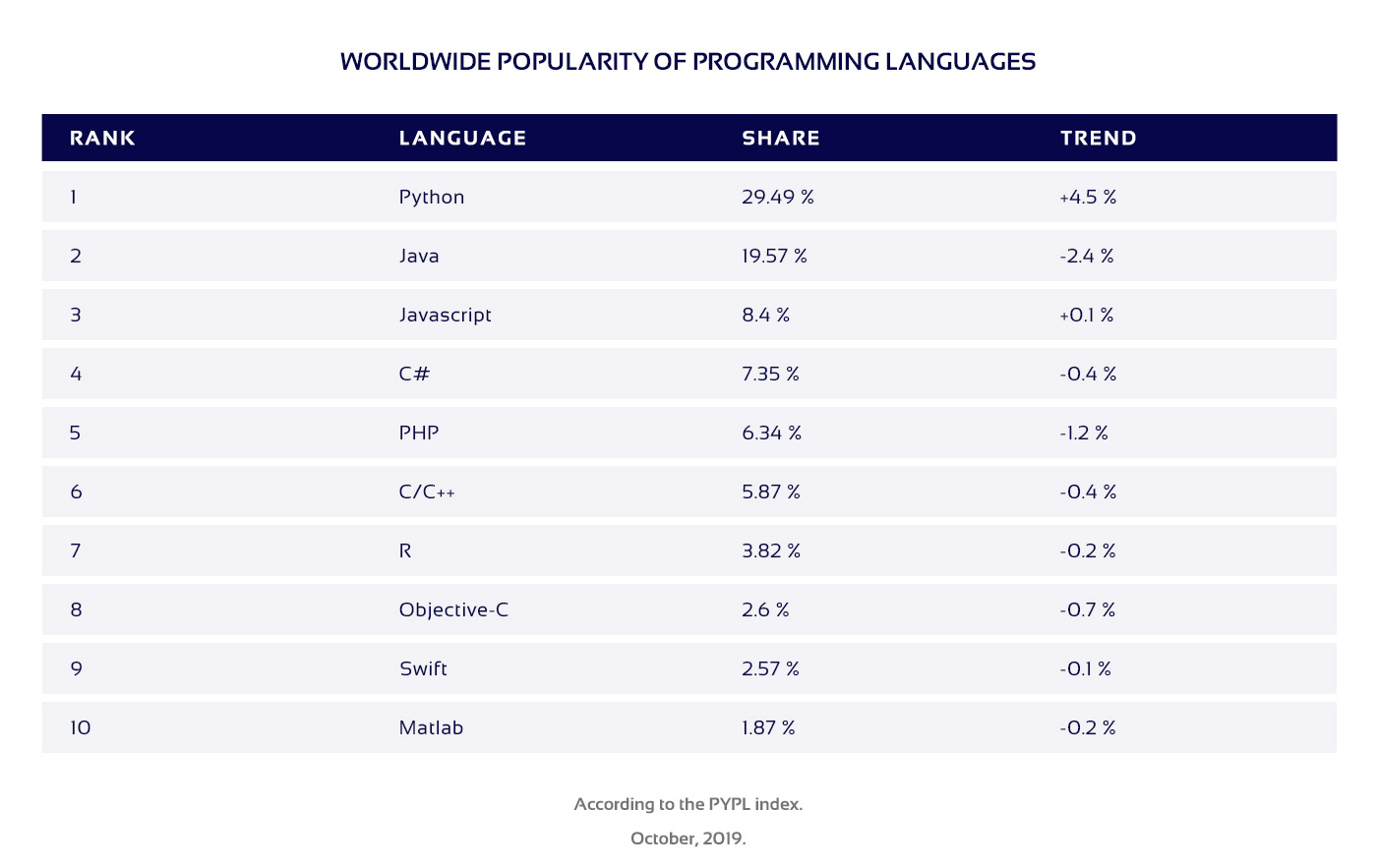The PHP programming language has been around for over two decades and established itself as a powerful and reliable solution, gaining an army of supporters and admirers. However, we need to acknowledge the elePHPant in the room: this coding language is gradually losing its popularity in favor of more recent and optimized counterparts. Let’s have a look at this technology and list pros and cons of PHP, define its area of use, and compare it with several competitive development tools.
What is PHP?
The name PHP stands for Hypertext Preprocessor and denotes a server-side scripting language, which means that the applications written on it run on web servers and do not depend on the web browser. However, over the years, its area of use has shifted, and nowadays the PHP coding language is ranked among the best and most popular programming tools for web development due to its many virtues which will be the focus of this article. It is considered a very effective technology that offers a convenient development process with many additional tools to aid it. In fact, according to the Popularity of Programming Language Index (PYPL), PHP is the fifth most popular coding language in the world.

What is PHP Used For?
As it has been already mentioned in this article, PHP is mainly used for web development, and it truly excels in this area. Though initially it was used to create dynamic web pages, developers prefer to use this scripting language for building the server side of web applications. However, PHP is originally a general-purpose language, so it may have other implementations if needed. For example, it is possible to build desktop applications using PHP. Moreover, starting from version 5, PHP supports object-oriented programming offering a whole new set of capabilities.
The versatility of this scripting language results from its excellent ability to combine with other programming languages. For example, developers may write extensions to PHP using the C language, which enables adding even more functionality. Moreover, PHP has a large number of available libraries and frameworks that extend its capabilities even further. The most popular examples of such frameworks are Laravel, Symfony, Phalcon, Zend Framework, and Yii.
Two of the most famous examples of software written on PHP are Facebook and Wordpress. Wordpress is the most popular content management system on the Internet: among all the websites that use such systems, about 48% of them employ Wordpress. Thanks to a large number of plugins, both built-in and third-party, Wordpress fits almost every role. You may use it to create a blog, a photo gallery, an online store, a news portal, and many other types of websites.
Facebook is another self-explanatory example of what PHP can do. This social network has long since evolved into a complex environment that has a diverse range of functions, including instant messaging, advertising, blogging, news presentation, video playback, and others, but is still based on the PHP code closely tied with other web technologies.
Advantages of PHP
The popularity of PHP is the logical result of its numerous advantages, all of which make it a powerful and effective development tool. Below is the short list of reasons why PHP is a great choice for your web app, which will be subsequently described in more detail.
9 reasons for using PHP:
- many available specialists;
- a large base of reference and educational materials;
- better loading speed of websites;
- more options for database connectivity;
- a large collection of open-source addons;
- inexpensive website hosting;
- great synergy with HTML;
- excellent flexibility and combinability;
- various benefits provided by cloud solutions.
Now, let’s review the listed benefits of PHP more closely in order to discover how they can be applied in practice to improve the quality, functionality, and profitability of your web app.
1. Large choice of available specialists
The popularity of PHP gave rise to the numerous community of developers, a fraction of which can be potential candidates for hire. The large number of available specialists results in high competitiveness and lower demanded wages, which is beneficial for reducing development costs. Besides, this language is rather easy to learn and implement, so even junior developers are usually able to effectively realize the basic functionality of an app.
2. Plentiful documentation
Many tutorials, manuals, and other reference materials are available, which facilitates the development and may provide help and the source of inspiration in tough situations. These materials are also invaluable for novice programmers making the learning process easier with gradually increasing difficulty. And, as was described above, learning PHP is comparatively easy, though not as easy as learning Python, for example, which further adds to its popularity.
3. Improved loading speed
The use of PHP makes website pages load faster as compared to many other web development technologies. For example, currently, PHP is about three times faster than Python for most use scenarios. In its turn, lower loading time is an important SEO ranking factor that helps further promote a website by bringing competitive advantages. A higher application speed keeps customers satisfied and, in combination with other advantages, helps build and retain the client base.
4. Wide selection of databases
PHP allows connection to almost any type of database. The most common choice is MySQL, mainly because it is free, effective, and popular among developers. Other solid options of database management systems compatible with PHP are mSQL, MS-SQL, SQLite, PostgreSQL, etc. Besides, PHP can be equally well used with ElasticSearch, Redis, MongoDB, and other non-relational databases. This way, the developers are not limited to using a particular database and may select the most optimal one for a future app, taking all relevant factors into consideration.
5. Inexpensive open-source software
PHP is a free-to-use technology that presents considerable savings for the development budget. Also, the majority of development tools that are usually utilized in combination with PHP are open-source software and can be used free of charge; thus, they additionally reduce the project cost. Moreover, there are numerous frameworks, such as Laravel and CodeIgniter, and various CMS, such as Wordpress and Drupal, for example, that extend the functionality of PHP and make the development process easier and more effective.
6. Cheaper hosting services
The most common operation scenario for a PHP website is the LAMP stack. It means that a website runs on an Apache HTTP web server deployed on a Linux system, and uses MySQL as a database. All these components are free, and the stack is well-tested, which implies the reduction of required time and funds for development.
7. Excellent combinability with HTML
PHP offers embedded HTML programming, which is the reason for the incredible synergy between these two technologies. In most cases, a PHP script does not interfere with the HTML code of a web page but instead completes it while remaining inside the borders defined by <?php ?> tags. And vice versa, if you have built a whole page on PHP, you may integrate an HTML code using a script. In this case, the difference from a traditional HTML page would be the inverted order of opening tags: the PHP tags would precede the HTML tags.
8. Good flexibility
Flexibility makes PHP able to effectively combine with many other programming languages so that the software product could use the most effective technology for each particular feature. Moreover, PHP is a cross-platform language, which means that developers may use any primary operating system – Windows, Linux, macOS – to perform coding. Such flexibility greatly facilitates the development process by making it faster and less expensive.
9. Compatibility with cloud services
Nowadays, many modern products tend to use cloud computing solutions like Amazon Web Services, for various purposes. Applications written in PHP are supported by different cloud services, such as AWS Lambda, for example. Thus, a PHP application can be deployed on a cloud server and achieve excellent scalability and other beneficial effects. Even more, the area of cloud computing is not monopolized by other coding languages, so PHP has taken its place in such implementations.
Disadvantages of the PHP Language
Though PHP is undoubtedly useful in the field of web development, it also has several disadvantages that prevent it from dominating that area. For the sake of an unbiased review, let us examine these drawbacks and learn how they can be detrimental for the future software and its business implementation.
Top 3 drawbacks of PHP:
- popularity decrease;
- lack of specialized libraries;
- security problems.
1. Declining popularity
While PHP is a powerful tool supported by a large community and plentiful reference documentation, there are easier programming languages for web apps. For this reason, novice developers prefer learning Python as their first language and rarely consider adding PHP to their skillset. Currently, PHP dominates the web development segment, but this most likely will change in the future. The number of specialists will decline eventually, and there will be a lack of novice developers that offer basic skills at a low price, so the costs of products built on PHP will probably rise.
2. Lack of dedicated libraries for modern needs
For example, machine learning is a hot trend nowadays, and it is definitely going to keep its popularity in the near future. While PHP has its set of libraries, it cannot compete with Python in developing web applications empowered by machine learning. Currently, PHP cannot offer equally fast and effective alternatives to Python’s TensorFlow, Scikit-learn, Theano, and Keras. This way, if your app requires ML functionality or may require it in the future when your business scales up, PHP is not the best choice.
3. Security flaws
Over the years, the concerns regarding the security of PHP-based products still persist due to several reasons. One of them is the open-source nature of PHP, which means that the possible code vulnerabilities become the common knowledge after they have been found. Thus, at least in theory, during the period between their reveal and fixing in the new versions of the programming language, those vulnerabilities may be exploited by any programmer with the malicious intent and adequate skills. However, this drawback can be equally attributed to other open-source technologies in general, as it mostly refers to the open-source model and not the PHP language in particular.
The second reason for PHP having a bad reputation regarding its security is the low entry barrier for novice programmers. As a result, a number of websites and apps are developed by inexperienced coders, trainees, or even hobbyists. The shoddy results of their work contribute to the rumors and facts regarding overall bad security and performance of PHP. However, if you refer to a development company with a good reputation and a team of experienced and certified specialists, you shouldn’t worry about the security of your product.
Near and Distant Future of PHP
Currently, PHP is still at the top of the web development world. A considerable share of all websites run on this programming language, and the easy-to-use CMS Wordpress continues to gain popularity. It allows users to design and deploy their own websites on free or paid hosting platforms with just a couple of clicks. That’s why the near future of the PHP language seems bright as it will continue to evolve and be used extensively.
However, the distant perspectives of PHP raise some concerns regarding its future viability in web development. For example, Python already attracts more new developers than PHP, and this trend is not likely to change soon. Besides, Python deals with some highly demanded features, such as machine learning, better than PHP due to the presence of specialized libraries. At this rate, PHP needs a significant leap in its evolution to catch up with Python, otherwise its popularity will continue to wane.
Conclusion
Considering all pros and cons, it is possible to finalize the business benefits and answer the logical question “Why use PHP?”
- It is extensively popular, so you are sure to find the development team that fits your needs.
- It is fairly easy and well-documented, so the development process will probably take less time.
- It is extremely flexible and combines well with other web development technologies, so the development team will have more tools in its disposal.
- It is an open-source technology that allows reducing costs required to build, deploy, and maintain your application.
- It is faster than other web development technologies, for example Python, especially when used for simple applications.
Finally, if you require a custom-built web application but still unsure what technology to pick, contact us. Our specialists will propose the optimal stack of web development technologies specifically for your needs and build a top-quality software solution.





